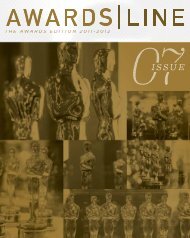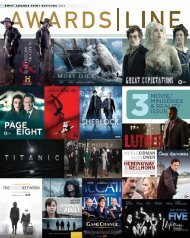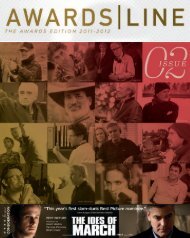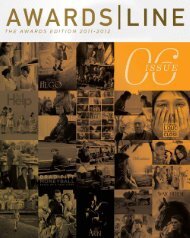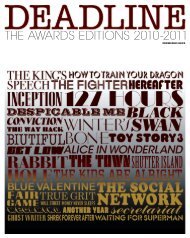THE AWARDS EDITION 2011-2012
THE AWARDS EDITION 2011-2012
THE AWARDS EDITION 2011-2012
- No tags were found...
Create successful ePaper yourself
Turn your PDF publications into a flip-book with our unique Google optimized e-Paper software.
French Producer Thomas LangmannTurns the Volume Up on theSilent Film With The ArtistBy ScottTimbergFrench producer Thomas Langmann is as much ofa hybrid as the film he is currently promoting: thesilent, black and white title The Artist, written anddirected by Michel Hazanavicius.28 The Awards Edition <strong>2011</strong>-<strong>2012</strong> Issue 01LANgmannLike the Artist’s Hollywood matinee idol George Valentin(portrayed by Cannes Film Festival best actor winnerJean Dujardin) who lives between the worlds of silentfilms and talkies; Langmann’s producing sensibilitystraddles the spheres of Hollywood and France.As the son of director Claude Berri, Langmann knowswhat French audiences want, evident in his Frenchblockbuster producer credits Asterix at the Olympic Gamesand the Mesrine French criminal series starring VincentCassel. However, Langmann is also familiar with theAmerican way of making movies, having cut his teeth asa gofer on such productions as Francis Ford Coppola’sThe Godfather: Part III and Steven Soderbergh’s Kafka(produced by Langmann’s uncle Paul Rassam).The Paris-based Langmann spoke to Awardsline about hisroots, producing style and rolling the dice on a long-lostfilm genre that’s a gamble by French and U.S. standards.<strong>AWARDS</strong>LINE: You came into the film at a pretty early stage. Whatwas it about Michel or his idea that made you want to get involved?LANGMANN: I’ve known Michel for quite a long time: I’veknown his movies and wanted to work with him on aproject called Fantômas, based on a very famous characterin Europe. He said, ‘I want to do it as a black and whitesilent.’ I responded, ‘Well, that’s not really what I want tofor Fantômas, but if you like black and white silent movies– it’s an original idea – why not do an original script?’ Ipaid him to write a script and he completed it within fourto five months. The script was a well-written, simple story.<strong>AWARDS</strong>LINE: As artistically exciting as the idea was, didn’t it seem like a blackand white silent movie would be commercial suicide, especially outside France?LANGMANN: Yes, even in France. I knew it would be extremelydifficult to finance, maybe impossible. Both Michel and Iare lucky that we’re making commercial movies in France.But television channels here have no interest in black andwhite movies. We had to change distributors; Warner Bros.France came in just as we were shooting.<strong>AWARDS</strong>LINE: Michel described you as the craziest man in France. Doyou see yourself as a risk-taker?LANGMANN: Well, that’s the way I’ve been told to makecinema. Cinema is gambling. It is better to gamble on aunique film even if it seems like suicide. I told [Michel],especially when The Artist went over budget – he keptasking for more money, we went to the U.S. to make it areal American movie, because of the subject – I told him:‘The only way is if you make it a masterpiece. Otherwisewe are in deep shit.’<strong>AWARDS</strong>LINE: Let’s talk about The Weinstein Company. What didthe Weinsteins see in the film that made them want to distribute it?LANGMANN: Harvey (Weinstein) flew to France just towatch a black and white silent film he knew little about.He came about eight weeks before we went to Cannes.The film wasn’t completed (in its entirety) at that moment,but Harvey sat alone in the screening room and loved it.He’s also a crazy man. Harvey wasn’t with anyone elsefrom his company nor friends. He was the only one inthe screening room. Afterwards he said, ‘I want this film.’The movie at that stage was nothing. The movie wasn’teven assured to be released in France.<strong>AWARDS</strong>LINE: What did the film cost and who put the money up?LANGMANN: There are different ways to make up a budget.Michel and Jean reduced their salaries from their usualtake. We were close to 11 million euros and went a bitover budget to 14 million euros. Funding was provided byFrench pay TV channel CanalPlus, France¹s Studio 37,Francois 3 Cinema, Warner Bros. France and my ownproduction company, La Petite Reine.<strong>AWARDS</strong>LINE: Did the French government put any Euros in?LANGMANN: There were no subsidies at all because wedecided to shoot in the U.S. with an American crew.So we didn’t even ask. We tried to get a tax credit fromCalifornia, but we were unlucky on it. There’s a lottery.<strong>AWARDS</strong>LINE: You’ve been a successful blockbuster producer in France,with Asterix and the Mesrine films. Did that make financiers morecomfortable working with you on this film?LANGMANN: Not this type of film.<strong>AWARDS</strong>LINE: The Weinstein Company has had success with movieslike The King’s Speech and Inglourious Basterds. But therehave been some foreign films, i.e. The Concert [$658,000 domesticB.O.] and foreign-themed films, i.e. Miral [$373,000] that theycouldn’t break in this country. What made you think they were the rightcompany to take an eccentric film into the American marketplace?<strong>AWARDS</strong>LINE: We’ve known the work of Harvey going backto Miramax. I know Harvey is not perfect. But he lovesmovies. For that kind of movie, that’s what you want. Youdon’t think about making money first. For this movie, youneed to be passionate. I knew Harvey could be passionate,but I was in front of him when he saw the movie. We wereknown for making movies for Europe or just for France.<strong>AWARDS</strong>LINE: Did the Weinstein Company give you any assurance ofan Oscar © push?LANGMANN: We always spoke about going the first step. Wesaid if we got a nomination for best [foreign languagefilm], that would be great. But it’s not really a foreignfilm – it’s a silent film, shot in the U.S. with Americanactors [John Goodman and James Cromwell]; it’s almostmore American than France. It’s a rare case. Harveydidn’t just want to acquire English-speaking countries butnon-English as well – that gave us confidence. So we’d bepleased if the film got a nomination, but that was not ourfirst goal. You cannot make movies with this goal in mind;it never works.Dujardin<strong>AWARDS</strong>LINE: Are Oscars © important to you? Has the Academy beenfair to French films?LANGMANN: I have at my home, for more than 15 years, anOscar © from 1965, The Chicken [Le Poulet], for best short film.[The film came out in 1965; the Oscar © was awarded in1966.] When my father won, he did not have the money tocome to Hollywood, so he received it by mail. He gave it tome years ago and I’ve never touched it. It has the look of’65: I love this object; it has a lot of symbolism. •



